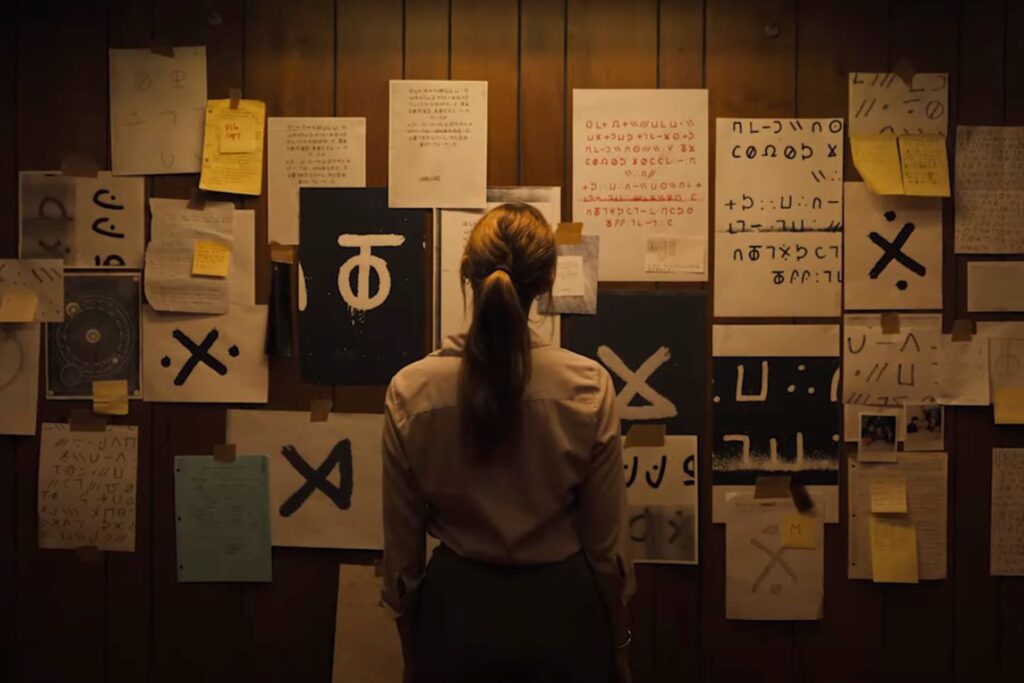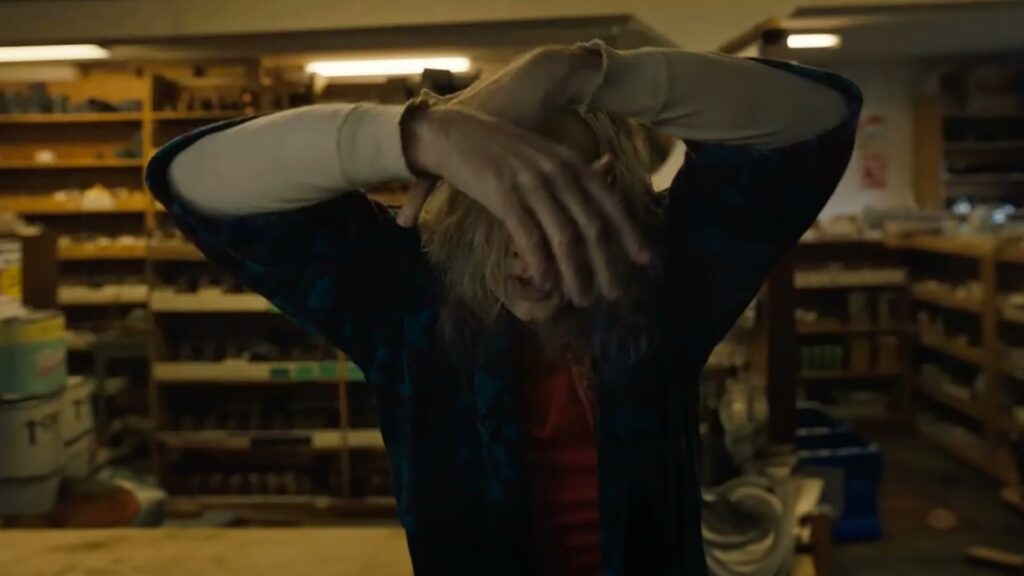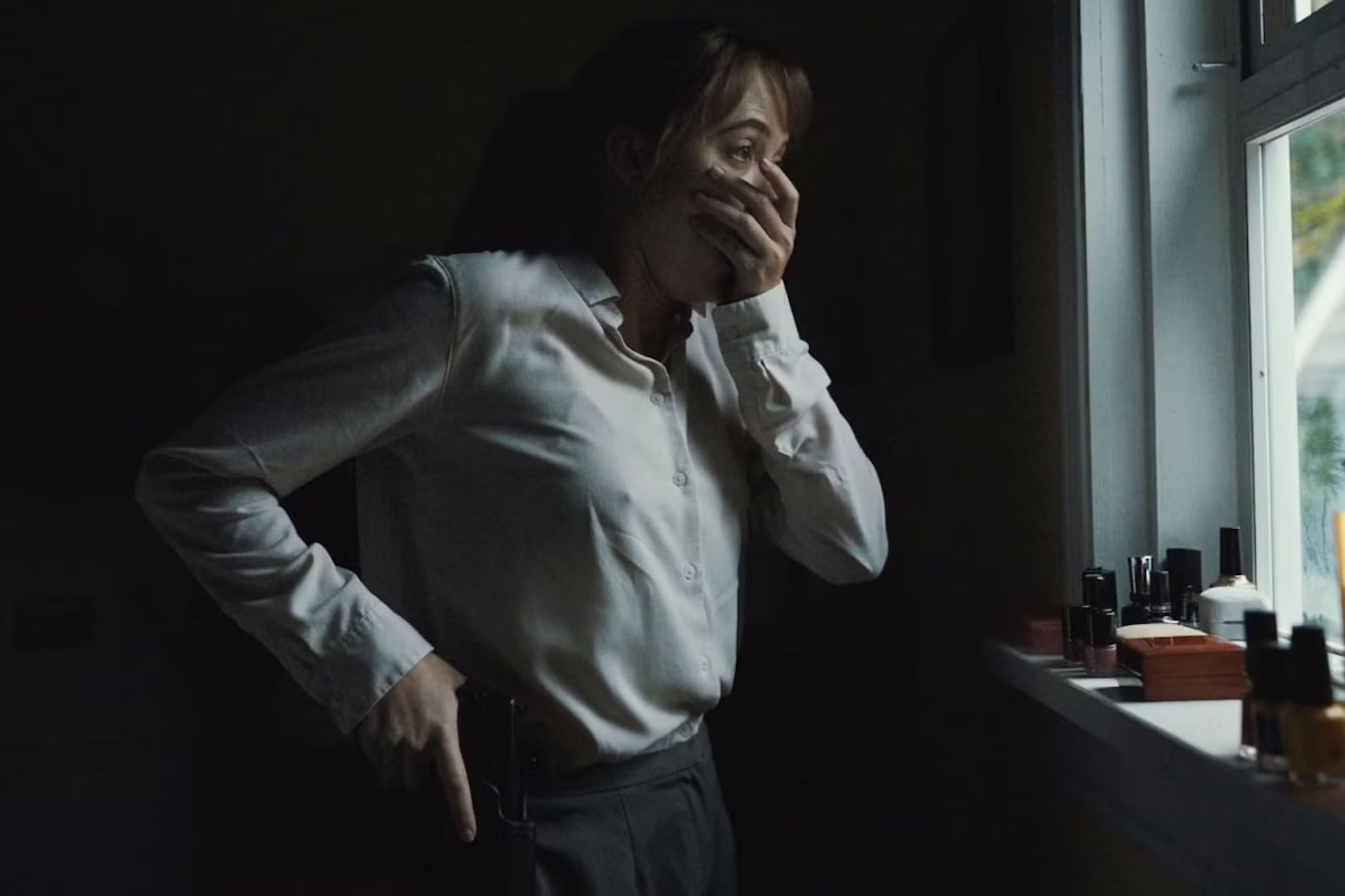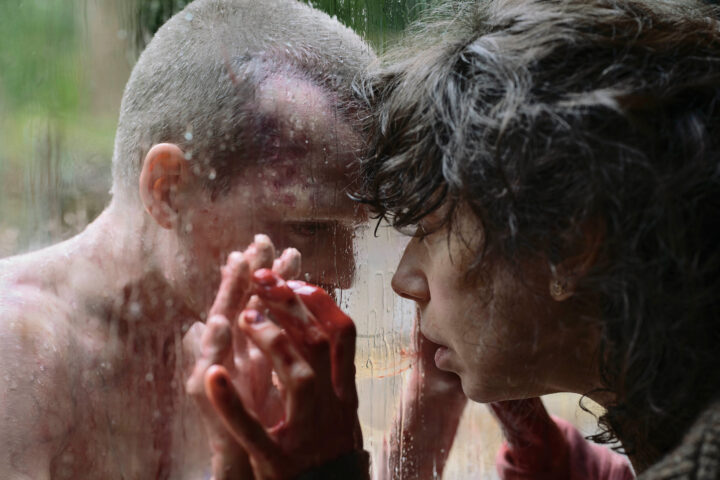The arrival of Longlegs—Osgood Perkins’ killer thriller about an FBI agent tracking a murderer—comes on the heels of distributor A24’s canny, months-long marketing campaign of carefully curated raves raising high hopes that just maybe a new horror “masterpiece” would be unleashed.
But landing in the post-buzz real world, Perkins’ picture reveals itself a would-be The Silence of the Lambs filtered through the chilly austerity of Seven yet lacking the airtight procedural investigation, visceral queasiness and character details of either. A periodically effective exercise in spiffing up a well-worn genre, what Longlegs chiefly has are standout performances from stars Maika Monroe and Nicolas Cage as a fledgling investigator and her intensely creepy object of pursuit. They are both superb even when their movie doesn’t quite keep up.
Perkins (2020’s stylish Gretel & Hansel) opens his atmospheric chiller during a rural Oregon 1970s winter as a young girl ventures from her remote country home to snap a Polaroid of a most bizarre, unexpected visitor. Flash forward to the 90s and a serial killer—who signs cryptic, crime scene leave-behinds as “Longlegs”—has been slaughtering dozens of families in the Pacific Northwest across two decades. Sullen-eyed and gravely serious newbie FBI agent Lee Harker (Maika Monroe) is assigned to bring him down, but she’s got her own issues, having recently witnessed the murder of her partner. She also possesses a curious extrasensory ability (“like someone tapping on my shoulder, telling me where to look”) to uncover clues.
Perkins immediately establishes a milieu so cold, desaturated and stylistically precise in cinematographer Andres Arochi’s aridly controlled compositions (there’s a clever use of dual aspect ratios) and color management that it suggests an almost otherworldly betrayal of reality (and does little to bring us closer to our lead character). In this world we meet Lee’s boss, Agent Carter, played effortlessly by a likable Blair Underwood, the pair teaming up to get their man, which includes the legwork of crimes scene visits (replete with gory decompositions) and deciphering the killer’s M.O.

That killer is elusive, to say the least, and despite leaving a trail of bloody carnage across decades he has mysteriously left no clues at the scenes of his handiwork—DNA and other physical evidence linking him to the murders are absent, suggesting he may not have been present during the crimes. How this might be possible is for Lee to find out, but the discovery of a very realistic, life-size little girl doll may hold a key. Disappointingly, Perkins’s screenplay offers little engrossing procedural and in terms of a fully-fledged investigation, not much sense of clue-by-clue discovery.
Diabolical Longlegs (Nicolas Cage), whose name is never explained, has a mysterious connection with the young agent. But where, how and when? What role does the calendar play? How about the children in each murdered household? For her part, Lee has a shut-in hoarder mother (a vivid Alicia Witt) and some darkly unresolved childhood issues. Is there a connection?
There is a bit of illogic here, namely a puzzling sequence where Longlegs sneaks into Lee’s home to deliver a personal message; strangely, she doesn’t inform Carter of the dangerous breach and it’s not spoken of again. And when Longlegs is finally apprehended, it seems far too easy a law enforcement coup rather than the result of enough (well-plotted) investigative legwork; it’s too rushed.
Despite the surface DNA of its better predecessors, Perkins’ picture doesn’t fully deliver. For starters, Monroe’s Lee Harker, while beautifully acted, isn’t written with enough real-world complexity to be relatable. The actress, a stellar contributor to 2014’s celebrated cult thriller It Follows and 2022’s superbly Hitchcockian Watcher (an exponentially better film than Longlegs), brings a brooding inner life to her tormented character, suggesting a tightly coiled, deeply troubled soul—all in Monroe’s clenched expressions and laser focus. She builds a compelling performance from what little is on the page.

One can’t help but compare Lee Harker to Clarice Starling, but Starling—a lower-middle class young woman diminished in a high-bar professional setting dominated by men, haunted by an adolescent episode before developing a surprising symbiosis with a killer— was dimensional and heroic, desperate to rescue a kidnapped woman from a psycho-sexual fiend. Good as Monroe is, Perkins doesn’t do any such heavy lifting with her character, written in two dimensions and acted in three.
The killer himself, played to the hilt by a depraved Nicolas Cage beneath a feat of gruesome make-up, is a grossly flamboyant figure so disturbing (listen to what Cage does with his vocal modulation and witness how a mere flip of his dyed, matted mane suggests menace) that we wish Perkins had given him a genuine pathology to play instead of a shopworn, horror movie fallback. But if the screenplay shortchanges him, Cage frighteningly dials up such conviction that every encounter, including a benign convenience store interaction, a shivery solo moment driving a wood-paneled station wagon and a late film interrogation are deeply unsettling. He’s resolutely macabre.
Special mention goes to an eerie scene in a mental hospital where the sole survivor of a family slaughter, played by an eccentric Kiernan Shipka, her dialogue/delivery so bizarre as to inspire goosebumps. If most of Longlegs is a slow-burn build, the final third lets loose with requisite shocks, violent confrontations and explicit effects. While Perkins’ resolution may be a tad over-plotted and a slight letdown from the film’s otherwise carefully calibrated style, no one can accuse him of not pulling out the stops.
Good performances, middling picture.
2 1/2 stars




Hey, Lee:
Your description “otherworldly betrayal of reality” is interesting as, for me, the movie’s flip into supernatural territory is exactly what separates it plot-wise from “The Silence of the Lambs” and “Seven.” I think Perkins is a superb director, though the 2 films of his you didn’t mention — “The Blackcoat’s Daughter” (a flat-out masterpiece for me) and “I Am the Pretty Thing That Lives in the House” (a compelling arthouse/horror hybrid) are far superior to “Longlegs.” For me, what holds “Longlegs” back from greatness is Cage. Never been a big fan, though he can be an entertaining over-actor in the right vehicle. While I appreciate his choice of vehicles has improved slightly in the last few years, he remains a performer with almost zero subtlety. I did not find him disturbing at all here — I was too aware of his showiness. With a different, better actor in that role, this could have been a movie on par with “Blackcoat’s Daughter.” I imagine what David Dastmalchian, Caleb Landry Jones or (if they could have afforded him) Cillian Murphy might have done with this role and it feels like a missed opportunity. I’d still up it a half-star from your grade, but “Blackcoat” remains the go-to for Perkins.
Hey Joel! Apologies on the delayed reply as I’ve been out of the country for a few weeks on vacation. I also admire Perkins and his fine command of style, tone and pace. However, with Longlegs I felt the film failed Maika Monroe in terms of giving her a substantive enough role; great of an actress as she is (particularly in Watcher), she’s largely a function of the plot without truly being a dimensional character. It also isn’t an effective procedural and has loose ends (a big one is the scene where Longlegs infiltrates her home, which is never mentioned again). I suppose I could go on, and while there were things I admired about the film, for me it was a mixed bag.
However, I could not disagree more on the subject of Nicolas Cage, whom I think is one of the all-time great, distinctive and committed American actors, whose decades of work reveal such diametrical opposition in choices, characters and tools that it seems to me undeniable that he’s a magician of an actor; a singular performer with a keen motivation in any genre. His performances in PIG, THE UNBEARABLE WEIGHT OF MASSIVE TALENT and DREAM SCENARIO, when combined with his LONGLEGS turn, illustrate an actor who can, and will, do anything. He never plays down to a character even when he makes wildly inventive choices (the bathroom scene in MANDY). Have you seen DREAM SCENARIO? That is perhaps one of his subtlest and most moving performances, and one that asks quite a bit from him in terms of gentle, introspective comedy and poignant pathos. It’s a hell of a performance and against type, if there even is such a thing for Cage. Agree that the other actors you mention would have been great in the role as well. Further, I thought Landry Jones was superb in DOGMAN. Did you see our on camera interview? Cheers and always good to reconnect with you! -Lee
I need to see “Pig,” as I have heard great things about it from several people. I’m not a big fan of “Dream Scenario” — great premise but so-so execution and I never bought Cage as that character, though I agree he toned down some of his mannerisms for that one. He has gotten some interesting projects off the ground recently, so I credit him for that, though he still works at a pace that suggests he has the same philosophy as Eric Roberts: “If the check clears, I’m in!” Good shout out for Kiernan Shipka in your review. She generates the chills Cage failed to create for me.